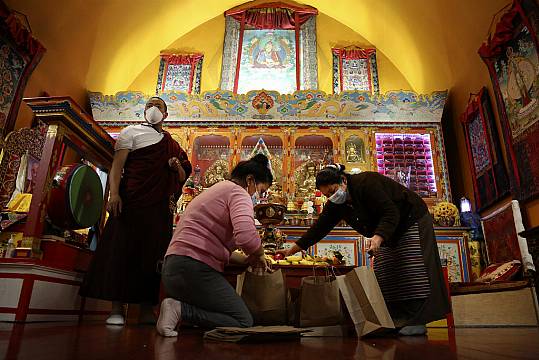A food pantry run by a Buddhist temple in New York City has become a lifeline for Nepalese college students living thousands of miles from their families during the pandemic.
Some were forced by lockdowns to leave dorms where previously they got most of their meals.
They do not qualify for federal stimulus cheques, and their student visas generally do not allow them to work full-time or off-campus to support themselves.
And there is often little help from home, with families in their heavily tourism-dependent country struggling this past year.
To help them cope, the United Sherpa Association launched a programme last April as coronavirus was ravaging the borough of Queens.

Inside a temple in the borough, monks clad in maroon robes chant and light incense and candles at an altar before a golden statue of Buddha.
Earlier, on the pavement outside, people with face masks, shopping baskets and reusable bags stood in a socially distanced line stretching two city blocks, waiting to collect badly needed rice, fruit and vegetables to get them through hard times due to the pandemic.
“It’s really a big help because you get all fresh, organic,” said Jyoti Rajbanshi, a Nepalese nursing student at Long Island University who has lost work and resorted to running up her credit cards and relying on the weekly pantry. “And then at least you don’t have to spend some money on buying the groceries.”
The Buddhist temple and community centre serves all people, including immigrants living in the country without legal permission and the swollen ranks of the unemployed, but it has become a particularly important lifeline for Nepalese college students.
“They don’t have unemployment insurance. They don’t have homes here. They are far away from home,” said Urgen Sherpa, the association’s president, who calls the students it helps “unknown victims” of the coronavirus crisis.

They are part of the estimated two million residents of New York City facing food insecurity, a number said to have nearly doubled amid the biggest surge in unemployment since the Great Depression.
Early on in the pandemic, residents of the immigrant-rich Jackson Heights, Elmhurst and Corona neighbourhoods of Queens were hit hard and tested positive for the virus in greater numbers than in other parts of the city. The United Sherpa Association closed its temple and cancelled its sports programmes, cultural activities and Sherpa and Nepali language classes.
It also sprang into action to help those who were struggling, with members calling contacts across the world to import masks, gloves and hand sanitiser that were often out of stock at local stores.
When the pantry launched, word spread through social media and students volunteered to pick up food and distribute it every Friday outside the temple, housed in a former Christian church.
Some of the volunteers are beneficiaries themselves, such as Tshering Chhoki Sherpa, a 26-year-old graduate student at Baruch College who started working there in July.
“It feels good being a part of it,” she said, “and also getting help.”
Beyond mere sustenance, the pantry also comforts the spirit, she said: “When I come here I feel like I’m back home, because everyone talks in Nepali.”







